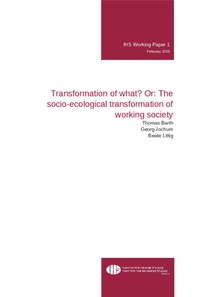Transformation of what? Or: The socio-ecological transformation of working society
"The critical strand of the current sustainability discourse often refers to Karl Polanyi's work "The Great Transformation" (e.g. “World in Transition – A Social Contract for Sustainability”, German Advisory Council on Global Change (WBGU), 2011). However, this reference is usual...
| Main Authors: | , , |
|---|---|
| Institution: | ETUI-European Trade Union Institute |
| Format: | TEXT |
| Language: | English |
| Published: |
Vienna
2019
IHS |
| Subjects: | |
| Online Access: | https://www.labourline.org/KENTIKA-19307395124911255779-Transformation-of-what?-or-The.htm |
| Summary: | "The critical strand of the current sustainability discourse often refers to Karl Polanyi's work "The Great Transformation" (e.g. “World in Transition – A Social Contract for Sustainability”, German Advisory Council on Global Change (WBGU), 2011). However, this reference is usually shortened, since in particular Polanyi's remarks about the commodification of labor are disregarded. Overall, work still plays a marginal role in the entire sustainability discourse. Consequently analytical as well as transformative potential remains unused. In our paper we want to put work into the center of the reflections on transformation and outline ways of a socio-ecological transformation towards a sustainable work society. For Polanyi the marketization of work and nature was in the center of his analysis of industrial society. He argues that market societies are constituted by two opposing movements - the laissez-faire movement to expand the scope of the market, and the protective countermovement that emerges to resist the disembedding of the economy. Thus transformation concepts which refer to Polanyi have to focus on the socio-ecological transformation of the working society. Accordingly, it is not just an energy turnaround as often argued, but a “work turnaround” that needs to be at the center of the (sustainability-oriented) transformation debate, which finally involves the re-embedding of the markets into society and the ecosystems. Summing up our arguments, we come to the conclusion that dominant sustainability-oriented transformation concepts fail (e.g. decarbonization, green economy), since they primarily aim at the ecological reorientation of market mechanisms. We argue that the initial point of the fundamental transformation of social relations and of social relations with nature is the (re-)organization of work. A transition to sustainability means in other words, reconceptualizing the global world of work by redefining the concept of work itself and its structural (e.g. the gendered and global division of work, paid/unpaid work, technological innovations) and institutional foundations (e.g. the role of the state). Exploring sustainable work provides a concrete basis for talking about both the direction of this transformation and the way to get there." |
|---|---|
| Physical Description: | 24 p. Digital |

